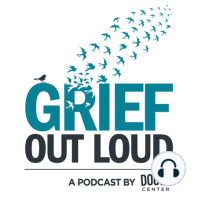11 min listen
Ep. 19: Advanced Serious Illness
FromGrief Out Loud
ratings:
Length:
26 minutes
Released:
Jul 24, 2015
Format:
Podcast episode
Description
How do we help children when a family member is dying? The diagnosis of a terminal illness brings uncertainty, fear, and heartbreak into their lives, leaving the adults who love them unsure of what to do or say. In this episode, Jana talks Tony Grace about how to best support children when a family member has an advanced serious illness. Here are some suggestions for ways to talk with them about the illness and activities to help them process their reactions, fears, and concerns. Children need space, time, and language to understand the changes that are taking place and that will take place in the future. If you have multiple kids of different ages, it is important to use words and phrases that are age appropriate for each of them. When communicating as a family, a good rule of thumb is to engage in conversation on a level so that the youngest child can understand, Have separate conversations with the older children and invite each child to have an individual conversation through the weeks and months ahead. In those conversations mentioned above, share what is happening, why it is happening, and what is most likely to happen if that is known. Be specific with names and diagnosis, but give simple explanations. It is ok if you don’t know the answers to their questions or even to your own questions. You can make a list of questions for the next doctor’s visit or visit a local library. Librarians are a tremendous resource and they can help you and your child look for age-appropriate materials, videos, and references. Additionally, many hospitals now include a family resource center or a patient medical resource center. Ask your doctor or nurse if your facility has one. Don’t be afraid to mention the word death; it is not giving up on hope but a recognition that we are all mortal beings. If we are alive, our death will be inevitable at some point. Being able to talk about death, whether it be about our own, someone else’s death, or the death of an animal, can actually provide a very deep and lasting connection between family members. In mentioning hope, it is good to be reminded that hope can and will be redefined over and over and over again. Hope may go from wanting to live long enough to you see your children’s children to hoping that your children will grow up to be an emotionally healthy and capable adult having being taught by your role modeling. It is also helpful to be reminded that our stories don’t end when we die, they continue in the lives of our loved ones...including our children. The illness and perhaps death of this family member will be part of that story, but it won’t be the final chapter.The current story that is being created is being “authored” not just by the illness, but by you, your family, and the people in your life. There is an opportunity for the story to be written in a way that can be beneficial for each person involved. Families will need to determine what that specifically looks like but generally, it looks like each person feeling informed, connected, valued, and able to express themselves. Many children and teens have vocalized the need to have a tangible connection to their sick family member throughout their lives. Some have asked for a memory box where they can put pictures, clothing, and other personal items. Others have wished for letters, videos, or tidbits of advice they can access as they get older. One family collected stories of the person who was ill so that their children can learn about who their father was from others. Another family had children videotape and interview the person who was ill, so in the future, they can be reminded of their interactions. Children with a sick family member often exhibit a lot of energy and in need of a lot of attention…and paired with a home that typically needs quiet 24/7 and focuses on the person who is ill, can often leave children feeling isolated and their energy stifled. Help identify positive ways to daily release
Released:
Jul 24, 2015
Format:
Podcast episode
Titles in the series (100)
Dear Dougy: Introductions: In this inaugural episode of the Grief Out Loud Podcast, Jana and Brendon introduce themselves, talk about the history of The Dougy Center, and our work with grieving children and their families. Jana and Brendon also do a little housekeeping... by Grief Out Loud
